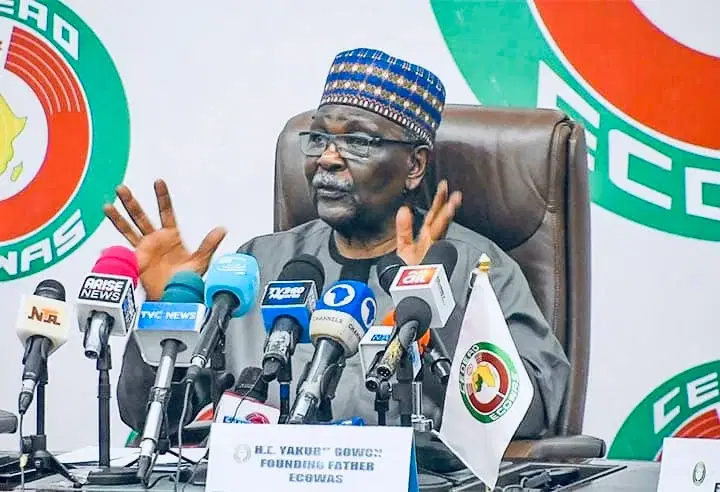Africa
Yakubu Gowon’s Meaningless Remorse -By Kene Obiezu
History is a painstaking record keeper. It has carefully recorded the roles all parties played in the bloody three-year Nigerian civil war, especially in the heinous atrocities visited on civilian populations in the Southeast. Gowon’s attempt to rewrite history is dead on arrival and will leave him with more eggs on his face than he can care to count.

As a country, Nigeria has known gut-wrenching agony and heart-wrenching tragedy. In 1967, fresh out of triumphantly giving the British and their brand of vicious colonialism a shove down the steep recline of history, Nigeria was confronted with a tragic civil war that threatened to break it apart. Ominously, the raging war which saw countless children starved to death threatened to turn the British prognosis that Nigerians could not govern themselves into prophecy. All these happened because young, exuberant and ruinously reckless military officers failed to check their hubris and histrionics.
By the passage of time, many of those who played key roles in the war have gone to join their victims. Many of them left without ever rendering a full account of what transpired during the war.
However, 90-year-old general Yakubu Gowon has survived and he recently stirred the ghosts of the civil war by pronouncing that it was never his choice and that he had no choice in the matter.
The civil war was a time of unimaginable turmoil for a newly independent country. Suddenly, it was as if Nigeria’s worst fears were upon her. With country men turning deadly weapons against their fellow country men, for once, it appeared as if Africa’s most promising country was about to self-destruct.
At the tip of the spear which threatened to impale Nigeria was a collection of military men who set the catastrophic course of events in motion with the disastrous military coups of 1966 and 1967.
A newly independent country which was still struggling to find its feet was always going to make silly mistakes, but the ruthlessness with which the young, intemperate military officers pounced to scuttle the direction of the country bespoke the kind of ambition that ruins empires.
At the end of the civil war, of course, after countless children had died of starvation,
Gowon was the Nigerian military president who called for healing and unity, famously declaring that there was no victor and no vanquished.
It is doubtful that Nigeria can ever recover completely from that terrible period. What the country has largely and creditably done is to move on from those months of horrible bloodshed. Confronting the historical trauma is another thing though and with Gowon’s recent attempt, it is clear that those left of the group that presided over and precipitated Nigeria’s darkest days have found neither compunction nor closure. How could they?
The ghosts of the Nigerian civil war have shown their undiluted potency in the way they haunt Nigeria. What they must be doing to those who oversaw the war and are yet to join their ancestors is better imagined than experienced.
For the generation of the Nigerian military that spun the country into the disastrous civil war, their legacy written in those bloody days is one of blood, especially the blood of children. For those like Gowon who survived the war and still live until this day, blood remains on their hands and conscience, stubbornly refusing to go away, no matter how hard they scrub.
Gowon has worked hard to appease the ghosts of the civil war. In fact, his entire life since he left office has been one long act of reparation. He has convened prayers for Nigeria, convoked national conversations and coordinated health missions to eradicate killer diseases. He comes off as a man in desperate search of inner peace. But with him, one gets the feeling that the wound on his conscience by the Nigerian civil war is one that cannot be healed.
Nigeria has largely moved on. Nigerians have largely forgiven each other. Even in the Southeast, where the war was bloodiest, the people have largely forgiven. Gowon should forgive himself too. He should also forgive all those who may have wronged him. At 90, it is the only way he can approach the night of his life in peace.
He definitely has his personal demons, but only the truth can suffocate them and set him free. He may have had no choice than to defend Nigeria, but surely, there were other ways that did not have to starve children or massacre hundreds in Asaba. Gowon had no choice but to defend Nigeria, but he surely had a choice in how his government chose to defend Nigeria.
History is a painstaking record keeper. It has carefully recorded the roles all parties played in the bloody three-year Nigerian civil war, especially in the heinous atrocities visited on civilian populations in the Southeast. Gowon’s attempt to rewrite history is dead on arrival and will leave him with more eggs on his face than he can care to count.
History may appear malleable, but just how savagely it burns the fingers of those who seek to rewrite it is well documented. Those who refuse to heed its lessons are often taught in the hardest way possible.
Kene Obiezu,
keneobiezu@gmail.com

























